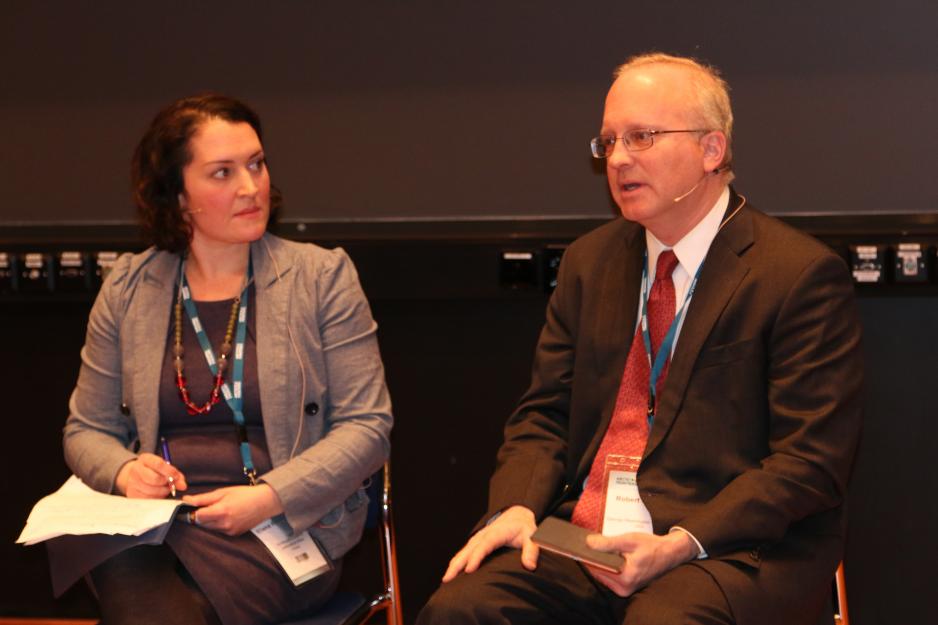Scientist: The Arctic may drown in global ‘big politics’

The Arctic, and the world’s attention towards the region, is facing an insecure future, if we are to believe Senior Researcher Elana Wilson Rowe at the Norwegian Institute of Foreign Affairs (NUPI). But the cooperation, among others in the Arctic Council, works well – even between Russia and the USA.
Syria, Brexit, a weakened EU, terror, the refugee crisis and the recent change of presidents in the USA. In a time where the world stage is marked by international conflicts and challenges to solve, one of the significant questions is how this will affect the further development in the Arctic.
“The challenge is that conflicts draw attention, and conflicts draw budget allocations” Rowe says, and continues:
“The question is how the Arctic will be prioritized in the future, and how this will affect for instance investments for better infrastructure. Will they come?”
Russia was the main topic when the Senior Researcher met colleagues from the USA and Russia for at debate during the Arctic Frontiers conference in Tromsø, Norway.
- An achievement
Rowe says that Russia, and the argument that the relationship with Russia should be further strengthened, was a recurring theme when she participated in the Arctic Circle conference in Reykjavik, Iceland, last year. Russia’s annexation of the Crimea, and the many subsequent sanctions between east and west, have led to a cooler political climate. Yet:
“What is fascinating and important to understand about the Arctic, is that it is not first and foremost about the conflicting issues, but rather that it is quite an achievement to actually maintain a dynamic cooperation in the region” Rowe says.
She points out that many of the international conflict areas that are preeminent in the media today are very complex, just like many of the questions related to the further development in the Arctic.
Rowe quotes an American professor, who said when asked to describe how a democracy works:
“He said ‘It is like sitting on a wooden raft. You will not sink, however, your feet will always get wet’.”
“We can say the same about some of the cooperation in the Arctic. It does not mean that it is easy, nevertheless, it means that there is an obligation to maintain the cooperation that is possible” she says.
- Important for Russia’s future
The Arctic is a priority for Russia, and the Senior Researcher at NUPI says it is obvious that some of the country’s worries are not only about the international aspect. Russia has many domestic worries too, and the biggest one is that of the country’s financial development. This does not only show in national and international media, but is also clearly evident in Russia’s strategy documents.
“The Arctic is a very important area for the financial future of Russia” she concludes.
She says that Russia’s Arctic strategy is well-known. It has more or less been the same for a decade now. It is all about economy, about maintaining the national interest of the country, and it is about protecting the environment.
“What we have seen in two different project we have worked on at NUPI, is that Russia, just like many other Arctic states, seek to separate the Arctic from other political areas.”
Indigenous people contribute to cooperation – and peace
The country has used the same approach after the conflict in Georgia and the conflicts in Ukraine. In the high-level forum of the Arctic Council Russia keeps engaging and meeting partners with identical and coinciding interests.
“We do for instance see that Russia and the USA cooperate about project ran by the Arctic Council” she says, and emphasizes the importance of thinking of Arctic cooperation as dynamic.
When Rowe opened the debate, she also pointed out how the Arctic cooperation in general now appears more driven by national interest than before.
“We see that many Arctic states more or less copy each other’s strategies, and there are several shared interests. We also see that the governance in the Arctic does not only happen on national capital levels, but it is also about networks that have grown into being in the various Arctic regions from the 1990s onwards.
“Several indigenous peoples participate in the Arctic Council, and they now stand up and want further cooperation and peace. One can also see that they have some sort of stabilizing effect on the various business and cooperation networks.”
Les artikkelen på norsk.
